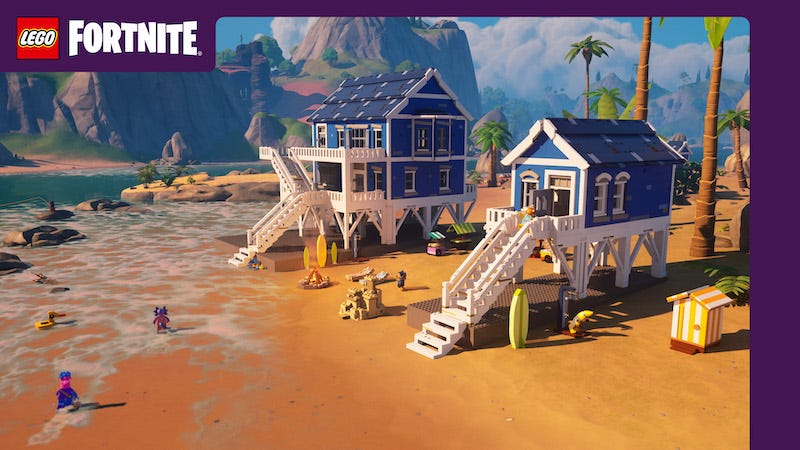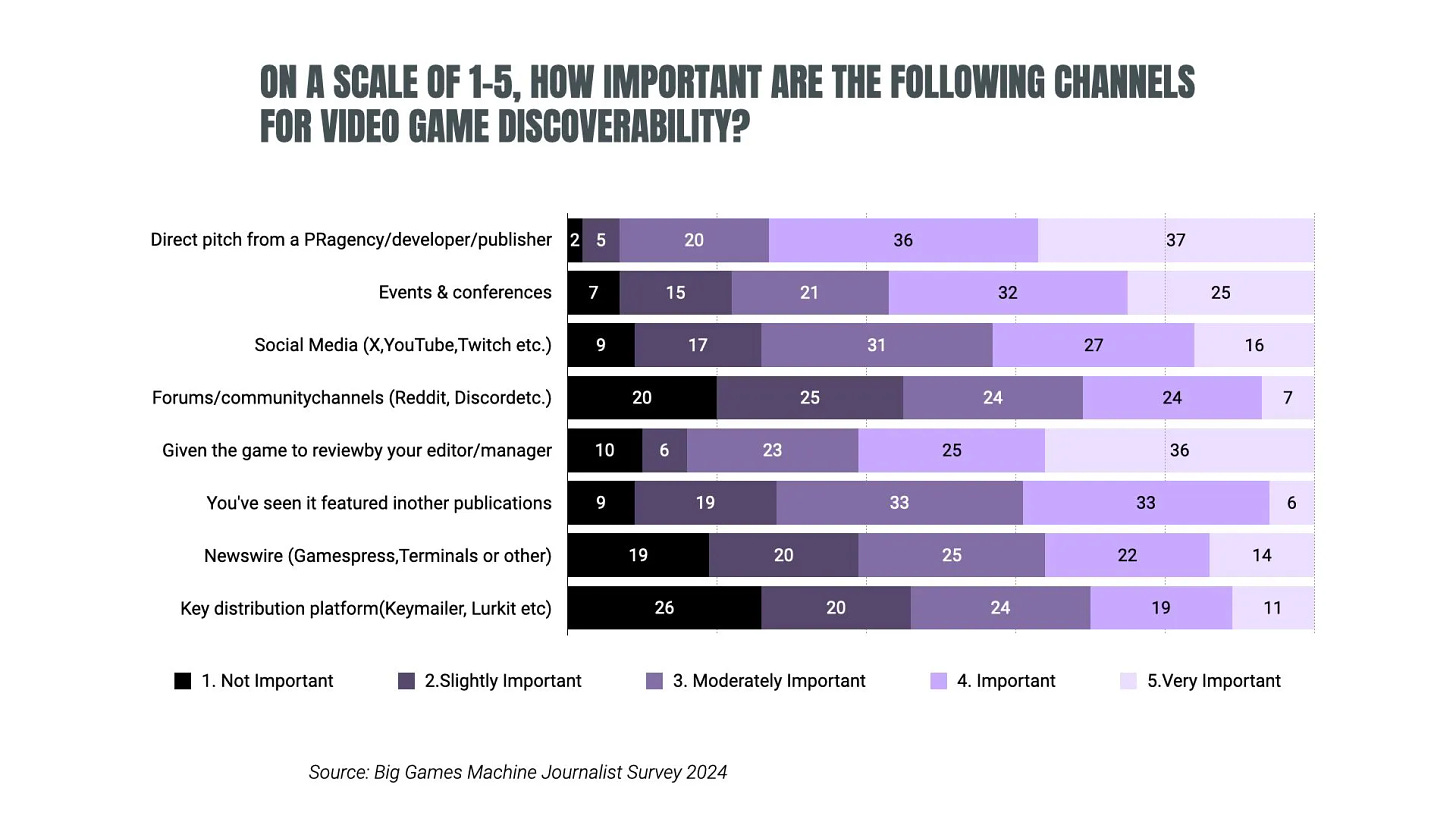What Electronic Arts thinks about the future of game discovery
Publikováno: 11.3.2024
Also: intriguing game journo surveys, discovery news & more..
[The GameDiscoverCo game discovery newsletter is written by ‘how people find your game’ expert & company founder Simon Carless, and is a regular look at how people discover and buy video games in the 2020s.]
We’re back! It’s the week before GDC 2024, also known as ‘how many meetings can you cram into a single day before you actually turn into a meeting?’ - we wish all you business types much luck. (Also: timezone confusion fans, remember the U.S. did its daylight savings time change already but Europe didn’t.)
And we’re not afraid to keep bringing the content, thanks to our small but perfectly formed team of coders and data experts. So we’ll keep on keeping on - we’re kicking off this time with a look at Electronic Arts’ views on the discovery landscape.
[REMINDER: you can support GameDiscoverCo by subscribing to GDCo Plus now. You get full access to super-detailed Steam data for unreleased & released games, weekly PC/console sales research, Discord access, seven detailed game discovery eBooks - & lots more. ]
What EA’s CEO thinks of game discovery’s future

Electronic Arts has a storied history in the game biz, having been founded in the early ‘80s as a ‘highlight the game developer as a creator’-centric company. (In fact, I have that classic 1983 ‘We See Farther’ ad framed in my office, above my monitor.)
And forty+ years later, EA is still alive and kicking, if a tad more corporate - with a $36.7b market cap, a stable post-pandemic share price that’s 10x over the last decade. With a few big, ‘recurring yearly revenue’ brands to the fore, it’s the opposite of the scattershot ‘just buy everyone’ approach Embracer seems to have tried.
So it was fascinating to see EA’s CEO Andrew Wilson appear at the influential Morgan Stanley Technology, Media & Telecom Conference last week. His full remarks are here [.PDF], though his target demographic for this talk was shareholders & analysts, not us.
But that’s precisely why his broader views - rarely aired this aspirationally in earnings calls - are so interesting to look at. And here’s some of the game discovery takeaways we had from Wilson’s comments:
Wilson believes in the ‘big get bigger’ maxim for games IP: he says “we're… seeing a gravitational pull towards the biggest IP” recently: “for us, that's [EA Sports] FC, that's Apex [Legends], that's The Sims, that's Madden [NFL]” - and Battlefield, which EA is doing rehab work on. (EA is light on launching new IP, and Wilson says they will “double down on our core franchises and our core business and our core communities.”)
The short-term growth opportunities for PC/console? Not giant: in aggregate, EA’s CEO says: “We expect mobile to be kind of low single digits growth this coming year. It's been kind of down. We expect HD, the console/PC market to be relatively flat.” And he then notes that “much of that mobile growth is driven by the top six titles, at least in the Western market.” So again - it’s about maximizing the big IP you have.
EA is looking to ‘Fortnite’-ize Apex Legends, genre & reach-wise: the latest financials revealed EA’s PvP shooter “did not meet our expectations”, as the fanbase is trending a bit hardcore? Wilson cites the recent Season 20 changes - which players agree were an attempt to get easier onboarding, for a game he says is “not for the faint of heart.” And he adds: “How do you expand beyond the traditional Battle Royale universe?… we'll start to see that in the coming year.” So will there be whole new game modes, a la Fortnite? Likely so…
Beyond this broadening, something that also got games press discussion was Wilson’s discussion on artificial intelligence - particularly since EA’s timing is rough, if you’re one of the hundreds they laid off recently. But it seems like this is standard ‘we’re going to talk about AI to juice the stock price’ fare, rather than a big strategy shift. Notes here:
The signature hand-wave on this was: “about 60% of all of our development processes have high feasibility to be positively impacted by Generative AI”, citing easier building of stadiums for EA Sports FC or Madden: “We build a stadium in one of our sports games that would typically take us six months. This past year, it took us six weeks. It's not unnatural for us to believe that in the coming years, it will take us six days.”
But Wilson’s answer pivot - he’s not an AI megafan, he just plays one for the purposes of a Morgan Stanley interview - is to the idea of games as platforms. He references “meaningful technological advancement in media and technology, where you are able to democratize an industry and hand it over to the population at large.”
That’s what everyone wants - for their game to also be a platform. Wilson couldn’t be more clear - in having players “creating personal content and expanding and enhancing the universes that we create, and building and creating their own universes on our technology platform, all of a sudden, we are the beneficiaries of platform economics.”
So we’re talking more personalization, more user-generated content (like the Overwolf deal with The Sims 4), and more ‘you stay on our game platform forever and get new content all the time’. And Wilson concludes: “[If] I fast forward on a 10-year time horizon, there's probably going to be a dozen to two dozen massive online communities in the world… I think we, as a company, are going to have five or six of them.”
Well, bad news here - that’s what the other big companies in the space want, too - stable, repeatable ‘games as a platform’ revenue. (See: Sony’s pitch in recent years.) And at the very same conference, Warner Bros’ games boss J.B. Perrette, fresh from the Hogwarts Legacy win and the Suicide Squad loss, has very much the same view.
Per SeekingAlpha, Perrette says: “Our business, historically, there has been very AAA console-based… that's a great business when you have a hit like [Hogwarts Legacy]. It makes the year look amazing… When you don't have a release or… have disappointments as we just released Suicide Squad this quarter, which was not as strong, it just makes it very volatile.”
So what’s the answer? Besides expanding into mobile and F2P for Warner Bros, it’s: “How do we develop a game around, for example, Hogwarts Legacy or Harry Potter that is a live service, where people can continue to live and work and build and play in that world on an ongoing basis?” (OK, this could be a viable franchise choice - four Butterbeers, plz!)
It shouldn’t be a surprise that Warner wants GTA Online, but for Hogwarts. But it’s just not that easy to build from scratch and get everyone’s friend groups on board. Everyone wants it, but there’s only ‘a couple of dozen’ seats at the table. Therefore, to sinisterly quote a Paul Thomas Anderson movie title in conclusion, ‘there will be blood.’
Heads up: GDCo’s newsletter now taking sponsors

The GameDiscoverCo newsletter is approaching its 5th birthday (!) in July. And now we’re just about to hit the 25,000 free subscriber milestone, and have about 20,000 opens & views of most newsletters, we are at a scale where we can offer sponsorships.
We’ve set up a page on Passionfroot where you can look at examples, transparently see pricing, and request to book with us. Our B2B audience: “Business & tool decision-makers at major game companies [and platforms, VCs, etc]. (And plenty of indies!)”
So if you supply services to that market, we’d love to hear from you. FYI for readers - we’ll be running a maximum of one sponsor message per newsletter, in this ‘between A and B story’ position, and roughly this length. It’s kicking off next week…
What’s up with game journalists in 2024? This…
So we’re indebted to the folks at marketing agency Big Games Machine for doing a giant survey of ‘trad’ video game journalists - over 150 of them, including freelancers & full-timers for IGN, Game Informer, Eurogamer, PC Gamer, BBC, Kotaku, GameSpot & more.
This survey - which is excellent and you should read in depth - is a ‘state of their business’ overview. But it also has some very useful data - such as the above chart - on how video game writers discover content to write about.
Quoting from their executive summary directly, here’s some top points:
Game journalists are overworked. Nearly half of respondents (47%) say their workload has ‘slightly’ or ‘significantly’ increased compared to 12 months ago. Only 15% of respondents say their workload has lightened.
Video game news (63%), reviews (60%) and [guides] (50%) were chosen as the top three content formats generating the most site traffic.
Nearly two-thirds (62%) of respondents receive 11 to 50 pitches daily. 12% of respondents get over 50 pitches daily!
Lack of time (64%), too much of a focus on SEO (43%), and insufficient pay (40%) are the three biggest challenges facing video game journalists.
From GameDiscoverCo’s perspective, what we’ve noticed is a shift to guides and SEO-friendly content in the game writing space, as video-led coverage from YouTube and Twitch has overwhelmingly taken over the ‘most important for game discovery’ crown.
Part of the reason for this is simple: websites are not daily ‘appointment reading’ for most gamers. But getting picked up by trad editorial outlets can still be a significant boost - both mentally, and if you can get interest in volume.
And relatedly, Ryan Rigney’s latest newsletter muses on the role of game media, suggesting that it’s the ‘zero-click’ view that is sometimes more important than the article: “If you look at the way news and conversation flow together on social media, a big chunk of it could be summarized as reactions to headlines.. not… reactions to article content.”
So there’s still tactics for boosting your game’s interest through conventional writing, even if ‘optimizing for Google search results’ is tending to skew everything. (Read this look at low-quality ‘product recommendations’ using well-known IP like Better Homes & Gardens, if you want to be slightly depressed re: search ‘warping’ the web.)
The game discovery & platform news round-up…

And it’s Monday morning, and we have *covers eyes*, uh, 23 different links to round up (or push to Wednesday!) around game discovery platforms & news. Let’s do it:
Sunday was MAR10 day, of course. So we got a few Nintendo announcements: release dates for Paper Mario & Luigi’s Mansion 2 HD, Game Boy releases on Switch Online for Mario Tennis & Golf (woo!), and the next Mario movie (with Illumination) confirmed for April 2026 with a choice ‘This is Miyamoto’ Tweet.
One notable data snapshot we missed from that huge ‘UK game biz in 2023’ snapshot last week: UK console sales, lifetime until the end of 2023, have the PlayStation 5 at 3.57 million units, and the Xbox Series at 2.53 million. (But remember that the UK & US are some of the top-performing countries for Xbox.)
The BAFTA Games awards nominations were handed out last week, and they were led by “10 nominations for Baldur’s Gate 3… Nine nominations for Marvel’s Spider-Man 2… Eight nominations for Alan Wake 2… Six nominations each for The Legend of Zelda: Tears of The Kingdom and Star Wars Jedi: Survivor.” Good luck to all!
Remember when Apple banned Epic’s European iOS dev account? Well, first the EU were looking into if this was a Digital Market Acts-compatible act, and then it got ‘fixed’: “Apple has told us and committed to the European Commission that they will reinstate our developer account. We are moving forward as planned to launch the Epic Games Store and bring Fortnite back to iOS in Europe.” Hurray?
When’s the best time to remake a game? GI.biz covered a new survey from Virtuos (who wants to co-dev more remakes!) & some research firms, and: “In terms of remakes, games released between 11 and 15 years after their original performed best, followed shortly by games released between 16 and 20 years ago.”
PlayStation’s most-downloaded games of Feb. 2024, according to Sony? Helldivers 2 is unsurprisingly top of the PS5 charts, with Red Dead Redemption 2 topping PS4 downloads (Bonus on Helldivers 2: in the UK, “its first three weeks on sale was only 28% lower than what Spider-Man 2 managed” in the same timeframe.)
Noted video game YouTuber Wanderbot has an-indepth article about ‘designing bullet heavens’ - aka Vampire Survivors-likes - that we would highly recommend. Tips include: “Make the enemies more than just a horde… make your upgrades worth coming back for… have compelling meta progression.”
Epic is going ahead with the first LEGO Fortnite-only monetization: in addition to more Lego-ized versions of regular Fortnite skins, you can now get kits that “include Builds, Building Parts, or Decor items” to decorate your in-game house only in that game. (They cost 1,900-2,500 VBucks per kit - in the $15-$20 range.)
Discord’s latest bid for game dev interest? Rewards for play via “Quests [which] let Discord users try out new games with friends and win stuff.” The company is making $600 million a year* on Nitro and other monetization (*per Bloomberg), would like to IPO, and here’s their blog post about Quests & new Shop items.
Esoteric microlinks: NYU prof Frank Lantz on why GeoGuessr is his new favorite eSport; how Hello Kitty creator Sanrio ‘tried to become the new Disney’ - movie-wise - in the ‘70s & ‘80s; the New York Times filed copyright takedowns against hundreds of Wordle clones.
Finally, we love Spelunky creator Derek Yu - heck, his ‘making of’ eBook is one of our Plus-exclusive perks. So we were excited to spot this older - but slightly unheralded - Game Informer video mini-doc, where he talks design while… actually spelunking?
[We’re GameDiscoverCo, an agency based around one simple issue: how do players find, buy and enjoy your PC or console game? We run the newsletter you’re reading, and provide consulting services for publishers, funds, and other smart game industry folks.]
